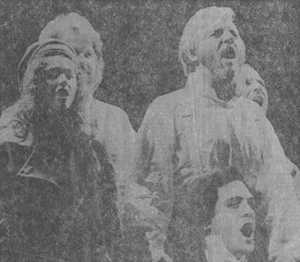Lloyd Webber
Aspects of Love
Phantom of the Opera
Starlight Express
Cats
Les Miserables
Miss Saigon
Metropolis
The Baker's Wife
Time
Stars of the Stage
Intimacy restricts effectiveness
Holly Hill reports on the New York opening of Les Miserables, and on mixed critical reactions to it
Shivering in 20-degree temperatures and a nasty wind, half of New York's Press corps huddled outside the Broadway Theatre wonder if Les Miserables would play its penultimate preview. A power-pack had blown in the computer and, unless repairs could be made, the show could not go on. "No electricity, no art", some chattered, recalling the big laugh-line from the Stephen Sondheim-James Lapine musical Sunday in the Park with George.
Shortly after eight, the audience was settled in the theatre. The producer, Cameron Macintosh, walked in front of the curtain, introducing himself and confessing "I hope this is my only appearance ever on a Broadway stage". He explained the problem, asked the audience's indulgence for half an hour, and was warmly applauded for the graciousness with which he spoke. At 8.30 there was a glimmer of light and movement from behind the curtain. More applause. Ten minutes later the curtain rose, and if there were any difficulties thereafter only the show's staff knew.
Having seen Les Mis (as it is called here, rather than The Glums) twice last summer in London, I think that the Broadway production is not as good. The massive appearance and 19th-century aura of the Palace Theatre are more congenial to the show than New York's more intimate Broadway Theatre, where John Napier's designs look less impressive. The coup de théâtre of the Paris slums turning into the barricades inspired little audible wonder at the performance I attended, probably because in less space it is not really awesome.
Both a gain and a loss is the repositioning of Javert's first solo, "Stars". It now comes just before the first student rebellion song, which strengthens the continuity of the story. However, if my memory is not faulty, I recall Javert singing before a virtual curtain of stars, as if he were alone with them in the universe of his imagination. To me it was the most artistically perfect piece of staging in the show. On Broadway we see Javert standing in front of the Paris slums, with only a smattering of stars above.
The Thenardiers, nicely played and sung by Leo Burmester and Jennifer Butt, are less the fawning, audience-milking comics here. This is a huge plus: the adaptation of Victor Hugo's grotesques was tasteless. After being urged to weep for Fantine and Cosette, the audience is supposed to forget that the Thenardiers drove Fantine to her death and abused Cosette terribly to have a giggle. Child abusers as comic relief? I wonder if even Fagin could or should win over audiences today.
Colm Wilkinson is as splendid as ever as Jean Valjean, and Frances Ruffelle repeats her appealing Eponine. Judy Kuhn has a lovely strong soprano as Cosette but, except for her and the Thenardiers, the American cast is weak vocally. Most of the other principals and many in the chorus who sing solo lines are not up to the music, particularly in the lower register or when the mood is intense.
Never a great admirer of Les Miserables, I went back to see it a second time in London because I was so distressed by the contrast between what it accomplished and where it failed (as in the examples of Javert and the Thenardiers). Having seen it now three times, I still salute the aspects which touch the grandeur of Victor Hugo's novel, and mourn those which fall short.
Frank Rich raved in the New York Times, his only reservation being the American actors. Rich commented that the directors, Trevor Nunn and John Caird, had "gone gloriously showbiz - with conviction, inspiration and taste", praised the "profligately melodious score" and "resourceful lyrics" and judged that the show was "in the highest tradition of Broadway musical production".
Clive Barnes in the New York Post stated that the show was "simply smashing" but also called it "superbly served, instantly disposable trash".
Howard Kissel of the Daily News praised the scenery and lighting and Colm Wilkinson's performance, but found the adaptation shallow, the score "drivel - singsong, repetitious, emotionally dead" and the lyrics "unbelievably simple-minded".
The first television review to come in called Les Miserables "a snob-hit - the kind of show that must be seen and cheered although in your heart you know it's hollow".

Frances Ruffelle as an appealing Eponine,
Colm Wilkinson (rear) as a splendid Jean Valjean
Holly Hill

